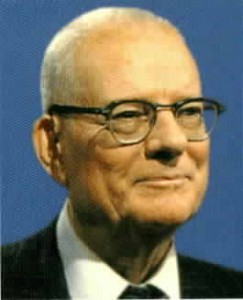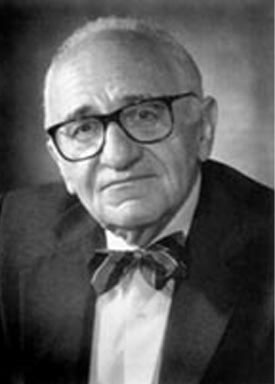W. Edwards Deming is one of the great management theorists of all time, and Murray N. Rothbard is one of the great economists and political theorists of all time. They share a few key traits in common.
Deming had a deep respect for theory. His writings and teachings were focused on changing how we think about issues, primarily, to challenge us to understand and embrace uncertainty. When introduced to his ideas, students (many were executives in large companies) would often transpose the ideas to fit their own frame of thinking, usually based in certainty. Looking for a shortcut, they would often ask Dr. Deming how to implement what he was teaching them. Deming, famous for his brevity, would respond with “farm tools.”
He didn’t like the term “implement” because it suggested that the questioner was looking for specific instructions, a prescription to plug in and magically make everything work better without being labored with changing the way they think. Deming knew that the student had to learn and acquire an understanding of the theory and ideas, so that he can first observe the issue correctly and proceed to improve his system with the benefit of a better approach. Simply attempting to “implement” Deming’s methodologies without first understanding the theory behind them would lead to disaster at worst, bastardization of good ideas at best. Deming was uncompromising on the value of theory.
Sitting in mega-corporate boardrooms with high level executives, Deming faced a major challenge. The hardest people to teach new ideas are those who have been successful with their own methods, their own paradigm. Deming represented an entirely different paradigm, and most were reluctant to challenge their own thinking.
Prior to accepting a consulting contract, Deming would insist that the top executive and his top people were in the meetings. Often, he would start a session by asking “how many of you have dead wood on your staffs?” Many hands were raised. Deming would then slam his hand on the table and thunder out “did you hire them that way, or did you kill them?” He was charging them with the responsibility to confront their long-held beliefs about management – that it was their own management system that destroyed innovation and turned good people into drones.
Murray Rothbard is one of history’s colossal champions of freedom. His great teacher, Ludwig Von Mises, said that ideas always win in the long run. Rothbard was committed to ideas, and was uncompromising on them. When he was funded by the billionaire Charles Koch to found the Cato Institute, Rothbard took the opportunity as a means to advance the causes of liberty and freedom. Soon after, Koch and some of his other appointees began to pressure Rothbard to compromise his ideas for the sake of political expediency. Rothbard refers to this as utilitarianism; starting with a bold idea and watering it down to be more palatable to the existing paradigm.
Koch, eager to be politically connected in Washington, recognized that to gain acceptance among beltway power brokers, he would need to appeal to their paradigm, and did not want to be too bold with ideas that would offend their sensibilities.
Rothbard, of course, would have none of that. He refused to water down his ideas for the elites of Washington because it would diminish everything he stood for. They parted ways, with Koch and his statist Cato Institute going on to become politically powerful in Washington while paying only lip service to the ideas of liberty and freedom. Rothbard moved on to a leadership position in the Ludwig von Mises Institute, which to this day is committed to ideas and shuns any connection with establishment politics.
Ideas change the world. Existing paradigms must fall out of popularity or usefulness before they are replaced with the next paradigm, and their adherents do not give up without a fight. The champions of ideas must be bold, uncompromising, and dedicated as teachers to lead the paradigm shift. W. Edwards Deming and Murray N. Rothbard were two great teachers that serve as an example for us all.

